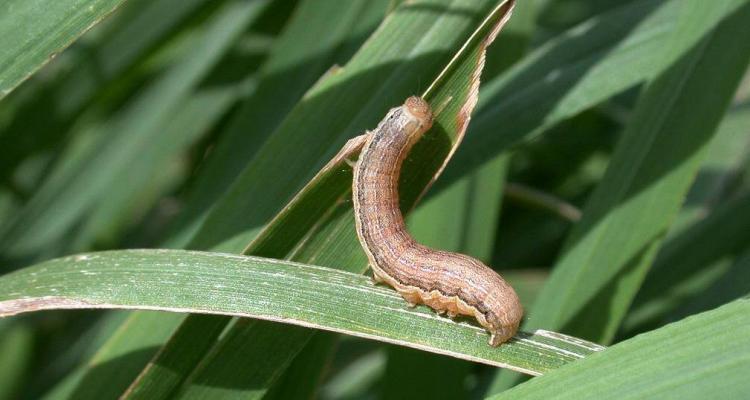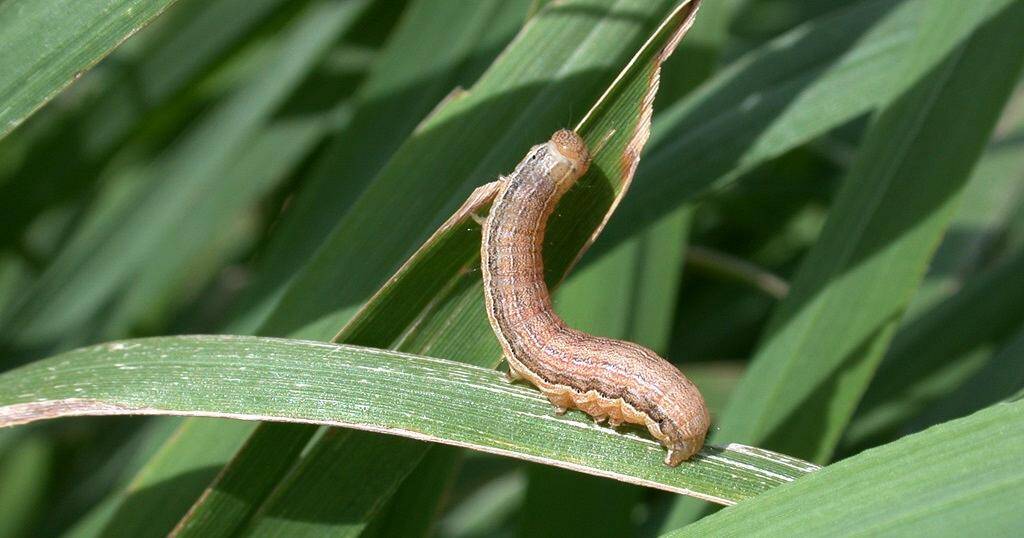
As armyworms continue to destroy crops in Malawi, some farmers are using local methods to fight the pests.
Farmers in Zomba are using things such as bonya soup and neem leaves to deal with the armyworms.

This was revealed during a meeting held at Traditional Authority Mwambo headquarters, which accommodated development structures from Zomba Likangala and Chisi constituencies.
According to Group village head Mbalu of the area, unavailability of chemicals has led many farmers to be using local methods of dealing with the pesticides.
Chief Mbalu said currently people are using pounded neem leaves and pepper, while others are using bonya soup, and crops are responding well where these have been applied.
In Zomba, 2398 hectares of maize have been severely affected by fall armyworms especially in Mpokwa EPA, in the area of Traditional Authority Mwambo.
According to Mpokwa Agricultural Extension and Development Coordinator (AEDC) Arnold Thomas Chikaonda, the most affected areas are the ones which are close to wetlands near Lake Chirwa.
Chikaonda said out of the affected hectarage, only 554 hectares have been applied with chemicals, due to inadequacy of the chemicals, as the area only received 40 litres.
He said inadequate supply of the chemicals has left many farms unattended and that this may likely affect the quantity of harvests this year.
In his remarks, Member of Parliament for Zomba Likangala constituency Honourable Peter Valani said there is optimism that the situation will improve saying the DADO’s Office had promised additional supply of 30 litres of the chemical.
He then urged those who will receive the pesticides to use them efficiently and as may be advised by the agricultural experts.
On 15th December 2017, President Peter Mutharika declared state of disaster in areas affected by the fall armyworms.















Sikidzi plus army worms eee!, nyasaland wafika pothela lets wait and see. Mvuto ndlakut tinamutsogoza mulungu kwambir pano tinamutaya ndye aah pa eisy satana wanthuyu akafuna ativetseko kukoma pa low gyz.
people who ain’t graduates,introducing new ways to deal with army worm. i dont condemn ignorance.
Nde akumatani ndi bonyayo?
wakumuzi kupeza njira zothanilana ndi zilombo, pamene Opita ku luana alibe mzeru zilizonse,tsekani college yanuyo,tingombera manja zisiru
Atleast bonya is useful now when people lost it’s appetite
I knew it. Only soup kkkkkkkkkk
Kufayira doom zimagwiraso
Kikiiiikioiiooii, teach us that method, kuno atigaila syipamethoet and its working
Bravo, you naughty farmers! That’s wht we call improvisation, it always works. Mmmmmh.
Use Soldiers
Kkkkk koma dzikoli latha ndithu just one bar remaining,nanga bonya nkukhala mankhwala a mbeu?? Mwina tiyesenso teargus
Kkkkk koma dzikoli latha ndithu just one bar remaining,nanga bonya nkukhala mankhwala a mbeu?
Boma liwagulile bonya wambiri alimi kut asavutike. Ndie akakolola awakanizeso kutumiza kunja.
as opposed to last year there is likely to be alower yield this year, so malawi be cautious.
policeworms and armyworms use bonya & neem ok
Bonya plus juice kkkkkkk
Mmmmh that indigenous method is gd bt my request to gvt this point n time is that the use of extension workers shd be clearly seen by sensitising people on gd ways of dealing with that pest
GIFT LIGWAMBA .Mulungu akuperereka mzeru kwa ana ake kuti tisavutike chaka chamawa.
Olo tisakolore, Peter alipo.
Akugona sanadzuke
akulephela kupha army worm nde angathandize?
akulephela kupha army worm nde angathandize?
One day Africa will Unite
Izi nde sizikugwirizana, mwagufatu baba pamenepa… Mmmmmh.
ok
Cyperine nde deal within 30 minutes all army worms will disappear
Kungowilisa bonyayo mutayikamo nchere. msusiwakewo timakawazira kumsonga kwambewu. zotsatirazake nyerere zimakwera nkukayamb kudya mbozizo. komanso fungo labonya mbozizi zimasowa mtendere ndipo zimafa ngakhale nyerere zisanakafike palimbozipo. NDAYESAPO INE ZIMENEZI NDIPO NDILINDIUMBONI KUTI ZIKUTHEKA NDITHU.
Zikuthekadi
Use police
there is no police worm but army worm use army thats all!
You are joking on issues of national interest, huh?! Mmmmmh.
dawa ninayo am akenya citizent
As armyworms continue to destroy crops in Malawi, some farmers are using local methods to fight the pests.
Farmers in Zomba are using things such as bonya soup and neem leaves to deal with the armyworms.
Farmers in Zomba are using bonya soup and neem leaves to deal with armyworms.(File)
This was revealed during a meeting held at Traditional Authority Mwambo headquarters, which accommodated development structures from Zomba Likangala and Chisi constituencies.
According to Group village head Mbalu of the area, unavailability of chemicals has led many farmers to be using local methods of dealing with the pesticides.
Chief Mbalu said currently people are using pounded neem leaves and pepper, while others are using bonya soup, and crops are responding well where these have been applied.
In Zomba, 2398 hectares of maize have been severely affected by fall armyworms especially in Mpokwa EPA, in the area of Traditional Authority Mwambo.
According to Mpokwa Agricultural Extension and Development Coordinator (AEDC) Arnold Thomas Chikaonda, the most affected areas are the ones which are close to wetlands near Lake Chirwa.
Chikaonda said out of the affected hectarage, only 554 hectares have been applied with chemicals, due to inadequacy of the chemicals, as the area only received 40 litres.
He said inadequate supply of the chemicals has left many farms unattended and that this may likely affect the quantity of harvests this year.
In his remarks, Member of Parliament for Zomba Likangala constituency Honourable Peter Valani said there is optimism that the situation will improve saying the DADO’s Office had promised additional supply of 30 litres of the chemical.
He then urged those who will receive the pesticides to use them efficiently and as may be advised by the agricultural experts.
On 15th December 2017, President Peter Mutharika declared state of disaster in areas affected by the fall armyworms.
Teach us tiphere..zinazake kuno
Zalowa bodza!!!!!
That would be interesting to know.How is that done? I dont have the bundle to follow the link, can someone save me a click please.
As armyworms continue to destroy crops in Malawi, some farmers are using local methods to fight the pests.
Farmers in Zomba are using things such as bonya soup and neem leaves to deal with the armyworms.
Farmers in Zomba are using bonya soup and neem leaves to deal with armyworms.(File)
This was revealed during a meeting held at Traditional Authority Mwambo headquarters, which accommodated development structures from Zomba Likangala and Chisi constituencies.
According to Group village head Mbalu of the area, unavailability of chemicals has led many farmers to be using local methods of dealing with the pesticides.
Chief Mbalu said currently people are using pounded neem leaves and pepper, while others are using bonya soup, and crops are responding well where these have been applied.
In Zomba, 2398 hectares of maize have been severely affected by fall armyworms especially in Mpokwa EPA, in the area of Traditional Authority Mwambo.
According to Mpokwa Agricultural Extension and Development Coordinator (AEDC) Arnold Thomas Chikaonda, the most affected areas are the ones which are close to wetlands near Lake Chirwa.
Chikaonda said out of the affected hectarage, only 554 hectares have been applied with chemicals, due to inadequacy of the chemicals, as the area only received 40 litres.
He said inadequate supply of the chemicals has left many farms unattended and that this may likely affect the quantity of harvests this year.
In his remarks, Member of Parliament for Zomba Likangala constituency Honourable Peter Valani said there is optimism that the situation will improve saying the DADO’s Office had promised additional supply of 30 litres of the chemical.
He then urged those who will receive the pesticides to use them efficiently and as may be advised by the agricultural experts.
On 15th December 2017, President Peter Mutharika declared state of disaster in areas affected by the fall armyworms.
Thank you Mr Chimalizeni
Mwakhwana bwanji Mr chimalizeni,zamalinkiz eeee,kkkkk,mbora
Thanx mr chimalizeni
Zikomo mr Chimalizeni nanga komwe sakuziwa njirayi atani? Koma boma ili
ASazwao awuzen inu mwazwa, zkomo bwana chimalzen english yabwno yonvekaso
Xikomo kwambiri Mr Chimalizeni
Masamba a neem mu chichewa ndi chani? Lost
Ndi nimu yemweyo
Koma nde nimuditu, nanga nkutani pamenepa… Mmmmmh.
“bonya soup” as madzi a bonya or kapena kuntani bonyao?? eager to know more
“bonya soup” as madzi a bonya or kapena kuntani bonyao?? eager to know more
Mmmm need chichewa name coz madera ena akuti sakumudziwa so I need chichewa name kut maybe ena mwadzinalo ndikukhalako ndi idea
Zikomo tamva nawo
kkkkk zafkapa kumangoyesa chilichonse bas
HOW DO IT WORK
How
Yes some